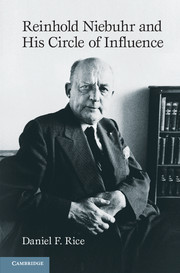Book contents
- Frontmatter
- Contents
- Acknowledgments
- Introduction
- Chapter 1 Paul Tillich (1886–1965)
- Chapter 2 John Dewey (1859–1952)
- Chapter 3 Norman Thomas (1884–1968)
- Chapter 4 Arthur Schlesinger Jr. (1917–2007)
- Chapter 5 Hans Morgenthau (1904–1980)
- Chapter 6 George Kennan (1904–2005)
- Chapter 7 Felix Frankfurter (1882–1965)
- Afterword
- Index
- References
Afterword
Niebuhr’s Continuing Relevance
Published online by Cambridge University Press: 05 November 2012
- Frontmatter
- Contents
- Acknowledgments
- Introduction
- Chapter 1 Paul Tillich (1886–1965)
- Chapter 2 John Dewey (1859–1952)
- Chapter 3 Norman Thomas (1884–1968)
- Chapter 4 Arthur Schlesinger Jr. (1917–2007)
- Chapter 5 Hans Morgenthau (1904–1980)
- Chapter 6 George Kennan (1904–2005)
- Chapter 7 Felix Frankfurter (1882–1965)
- Afterword
- Index
- References
Summary
Niebuhr’s Continuing Relevance
The pursuit of the relevance an individual might have beyond his or her own time is sometimes interesting, always speculative, and definitely fraught with likelihood of embarrassment. Certainly, with regard to seeking relevance in the form of how Niebuhr might react to future events, Arthur Schlesinger Jr. is correct in pointing out, “Nothing is more futile than trying to predict how people now dead would have responded to some later contingency; it is hard enough to predict the reactions of living people.” In general terms, however, Niebuhr’s stature and the recent publications that have surfaced regarding him deserve some reflection.
Charlie Citrine’s confession in Saul Bellow’s novel Humboldt’s Gift that he “was always thinking of statements that must be made and truths of which the world must be reminded” captures perfectly the basis of Reinhold Niebuhr’s continuing relevance. So many of Niebuhr’s analyses and insights continue to bear the marks of such truths precisely because in America so many things have a habit of recurring in a way that brings them again and again into stark clarity. The list would include America’s inordinate view of its own virtue, its persistent declaration of innocence, its penchant for utopianism, its swing between isolationist and interventionist foreign policies, its simplistic moralism, and its excessive individualism. These are just a few among the lingering habits that continually generate patterns and problems that resurface in new guises and in connection with any variety of “new world” events. Clearly, what continues to be relevant about Niebuhr is the intellectual framework and understanding he brought to bear on such patterns and problems. He both recognized and forcefully addressed these ingrained habits of our nation’s life. Niebuhr was a man wise about religion, insightful about politics, and astute about the contours and shenanigans of American culture.
- Type
- Chapter
- Information
- Reinhold Niebuhr and His Circle of Influence , pp. 247 - 250Publisher: Cambridge University PressPrint publication year: 2012

